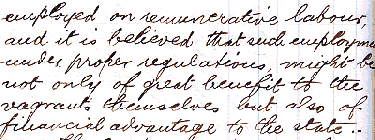
Care of the poor 15
Vagrancy
Besides the problems of looking after the poor of the Union, the Board of Guardians had also to meet the demands of wandering paupers in the rural landscape. As farming became more mechanised and units were bigger, fewer people could be employed on the land. Those who did not want to seek new opportunities in the industrial areas, or abroad, often became paupers and were left with the choice of the workhouse or the road. Many of these tramps could get temporary relief and shelter at the workhouse in return for their labour.
The entry below from 1908 records a letter sent by the Union to the authorities about the problem of increased vagrancy in the area.
Rhayader Board
of Guardians
Minute Book
Powys
County Archives
R/G/C/8/1/22


The entry begins with a resolution and
reads:-
"that this Board desires respectfully to impress
upon the Local Government Board and on His Majesty's Goverment
the necessity of dealing at once with the question of vagrancy,
the difficulty arising through the alarming increase in the number
of tramps, the impracticability of suitably employing them in
workhouses at a profit, and we fear, the serious menace in the
future to the peace and well being of the country, lead this
Board to the conclusion that the most practical solution of this
difficult problem is the establishment of "labour colonies"
or Government Works at which vagrants should be compulsorily
employed on remunerative labour, and it is believed that such
employment under proper regulations, might be not only of great
benefit to the vagrants themselves but also of financial advantage
to the state."
This advocacy of compulsory labour camps seems harsh to our late 20th century eyes, but the Board was faced with huge numbers of tramps calling at the workhouse. In one six month period around the time of the letter (1908) the workhouse gave relief to 2617 vagrants. For such a sparsely populated area the Union must have felt almost overwhelmed at times.